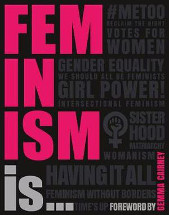Feminism is... by A. Black et al.

DK, 2019. ISBN 9780241228029.
(Age: 14+) Highly Recommended. Non fiction. Feminism is...
follows on the heels of the recently published Feminists
don't wear pink and other lies - a collection of feminist
essays edited by Scarlett Curtis. Both books consolidate the concept
of intersectionality but Feminism is...takes the form of a
lively reference book. It might be a contradiction in terms, but
familiar frames for lucid explanations reward every page turned. The
thought-provoking topics form double page spreads within each
section, including a handful featuring key historical identities.
Each topic fans out across the gutter to engage with stylized
diagrams, bold boxed headings and a monochrome photo.
It's a ready reference with all the accessible features plus a
directory, glossary and index. Textbook sized, the topics are
classified into broad sections: A political and social movement,
Body and identity, Relationships and families, Education and work
and Culture and society. The simple language explains complicated
academic concepts and the spectrum of topics range from 'No Means
No' to 'Feminism and Sex Work.' A further delight is that every
topic gives equal weight to the opposing views of different schools
of feminist thought.
Like its counterpart, the gambit of feminism is linked by a central
idea - that intersectionality is at the heart of feminism. Feminism
cannot exist in a vacuum. The majority of humankind identify with or
belong to more than one marginalized and exploited group. Feminism
champions equal rights for everyone who is a victim of patriarchal
institutions - in reality that means fighting for as many men (of
character) as women. The media, legal system, education and religion
are the pillars supporting tyranny of a privileged system that
filters through family, language, work, politics, culture and
sexuality.
Feminism has evolved. The book may be aimed at youth, but it
provides everyone with access and clear understandings of hitherto
complex academic theories. Secondary schools should stock a feminist
reference book so thoroughly executed, if only for the simplest
definition proposed by Gemma Cairney in the foreword: 'It's a
hopeful term to associate ourselves with - it means you believe in
human rights'. As a result, Cairney was invited to take part in the
'My Life in Objects' series for The Pool. Meet her online on YouTube.
Deborah Robins